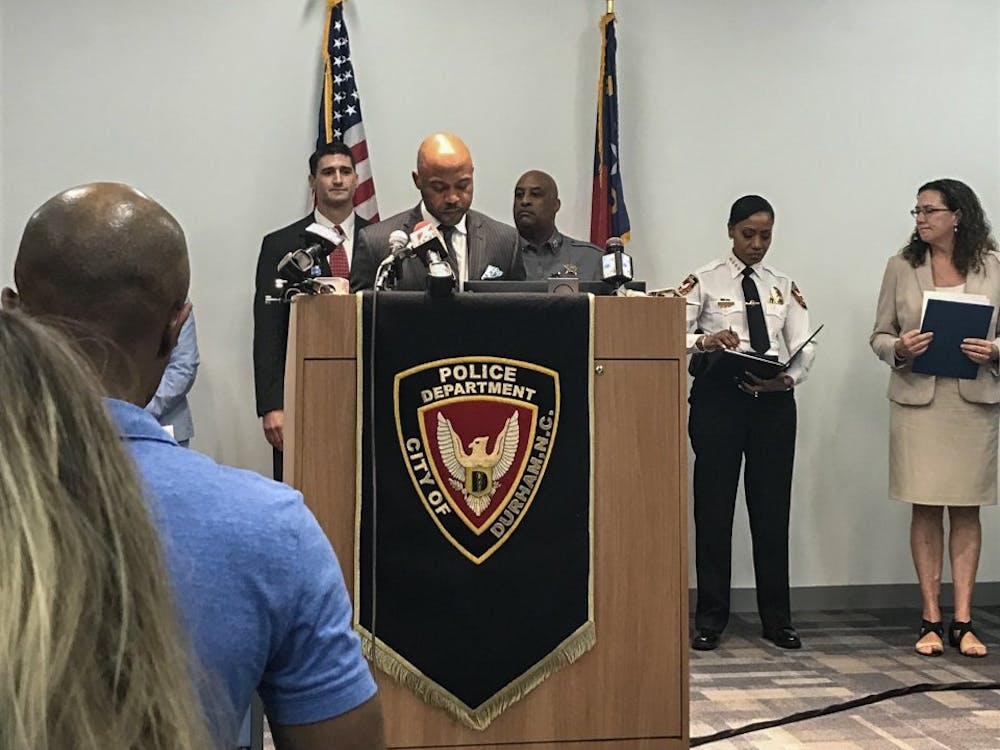Local leaders committed to fighting gun violence spoke at a press conference on Thursday, following two deadly shootings in Durham.
On Sunday, 9-year-old Zion Person was fatally shot in a drive-by shooting near the intersection of Duke Street and Leon Street. A day later, 18-year-old Kylik Burnette was killed in a shooting at an apartment complex on Chapel Hill Road. At Thursday’s press conference, local leaders described crime-fighting initiatives and reaffirmed their commitment to stopping such shootings.
“This is a tragedy beyond words, but it is not a tragedy beyond action,” Durham Mayor Steve Schewel said of Person’s death. “While we mourn, we must act, and we will.”
Schewel, Trinity ‘73 and Graduate School ‘82, said gun violence will not stop until the state legislature passes “common sense gun laws” that reduce the number of guns on the streets. However, he said that it was possible to “beat this violence back,” and that the shooting had sparked the community and law enforcement to act.
Durham Police Chief C.J. Davis said that law enforcement was “working with deliberate speed to identify those responsible” for the shooting of Person.
She described rising gun violence as the “greatest challenge” faced by the Durham Police Department. She said that combating the problem will require identifying individuals connected to acts of gun violence, handing down harsh sentences to repeat offenders and collaborating with federal task forces to get high-capacity firearms off the streets.
She outlined a number of steps that DPD had taken to accomplish these goals, such as allocating additional resources to the department’s homicide unit to “focus on known offenders possibly associated with recent incidents” and collaborating with a Bureau of Alcohol, Tobacco, Firearms and Explosives liaison agent to investigate gun crimes.
“Enforcement efforts will be intentional, targeted and laser focused,” Davis said.
Davis asked that people who have information about violent crime in Durham contact the police department or CrimeStoppers.
Matthew Martin, U.S. attorney for the Middle District of North Carolina, said that federal, state and local officials were working together to address gun violence. He added that he had spoken to representatives of the FBI, the Drug Enforcement Administration and ATF about collaborative efforts to eliminate gang violence and the drug trade, which he said was often connected to violence.
In particular, Martin said that the ATF was working with DPD to implement a system called NIBIN, a computer database of images of shell casings found at crime scenes.
Law enforcement can match the images from one crime scene with those from another, and when someone is arrested with a gun, officials can determine whether that gun has been used to commit a crime. He also said that individuals who committed violent acts would be federally prosecuted, a process that carries mandatory minimum sentences for repeat offenders.
Martin had a message for those who had been involved in violent acts or were considering them: “Your crime will find you out, and we will try our best to take you federal, and that’s a whole different ball game.”
Satana Deberry, Durham County district attorney, also touted collaboration between law enforcement agencies in her speech. She said that a small number of people commit most acts of gun violence in Durham County, and that the DA’s office was working together with DPD to identify those individuals.
Deberry added that the DA’s office had created a separate homicide and violent crime team. The office is working to clear a backlog of “nearly 100 pending homicide cases” and has held pre-charge meetings with law enforcement to ensure that there is sufficient evidence to charge each individual.
Wendy Jacobs, chair of the Durham Board of County Commissioners, struck a different tone in her speech. She described gun violence as a “public health issue,” whereby people who have experienced trauma or do not feel valued in the community are prone to commit violent acts.
“Violence can be stopped and cured, like any epidemic, and we are working on this right now in Durham County government,” Jacobs said.
She pointed to several initiatives that are currently underway: Bull City United violence interrupters, who resolve conflict and connect people with resources; the Durham Local Reentry Council, which connects justice involved people with “housing, jobs and healthcare” and the Project Build Gang Intervention Program, which provides support to at-risk youth to keep them from joining gangs.
Get The Chronicle straight to your inbox
Signup for our weekly newsletter. Cancel at any time.
Matthew Griffin was editor-in-chief of The Chronicle's 116th volume.

